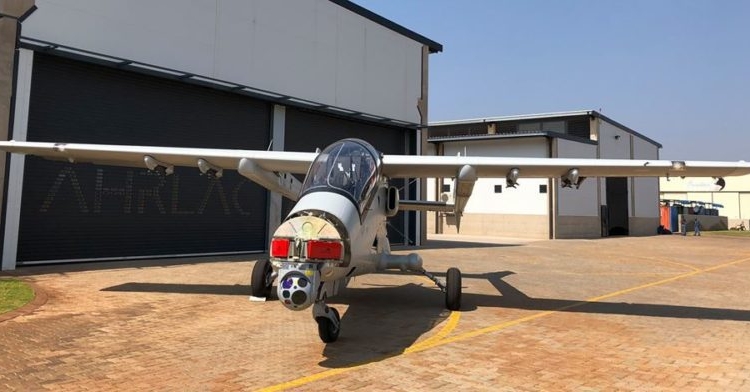AHRLAC Holdings, a joint venture between the Paramount Group and Aerosud recently showcased a prototype of its Advanced High Performance Reconnaissance Light Aircraft (AHRLAC) with a leonardo Osprey 30 multi-mode surveillance AESA radar.
According to the manufacturer of the Osprey 30 multi-mode surveillance AESA radar Leonardo, the Osprey is a low size, weight and power (SWaP)radar system, offered with a range of antenna sizes that may include up to four fixed antennas, depending on the azimuth coverage requirement, and which leave the belly of the aircraft free for operation to and from unprepared surfaces; or for other antennas, sensors or weapon systems.
Osprey is particularly well suited to unmanned air systems (UAS) operations, with very high reliability for persistent surveillance, and difficult target detection capability from high altitude, facilitating platform line of sight (LoS) communications and improved platform fuel efficiency.

The multi-role AESA design uses new technology, and also draws on elements of the formerly Finmeccanica unit’s Seaspray series of maritime search radars and its air-to-air and air-to-ground surveillance sensors, says Brendan Nolan, vice-president sales, radar and advanced targeting. The company claims it is the first system of its type to offer full spherical coverage with no moving parts.
Osprey is a low size, weight and power (SWaP) radar system, offered with a range of antenna sizes that may include up to four fixed antennas, depending on the azimuth coverage requirement, and which leave the belly of the aircraft free for operation to and from unprepared surfaces; or for other antennas, sensors or weapon systems.
Osprey provides a genuine multi-domain capability, with high-performance sea surveillance, notably against ‘difficult targets’, land surveillance with wide swath, very high-resolution ground mapping, small and low-speed ground target indication, high-performance air-to-air surveillance, tracking and intercept
Osprey 30 AESA Technical Specification
| Frequency | X-Band |
| Scan coverage | Installation dependant |
| Maximum range | 200NM |
| Mean Time Between Critical Failure (MTBcF) | > 2000 hours |
| Track While Scan | Up to 1000 tracks, with Automatic Track Initiation (ATI) |
| Maritime Surface Surveillance | Maritime surveillance Small target mode |
| Moving target detection | Ground, Maritime and Air MTI Air-to-Air Intercept |
| Antenna | 200x510x140mm (8x20x6 inches) |



